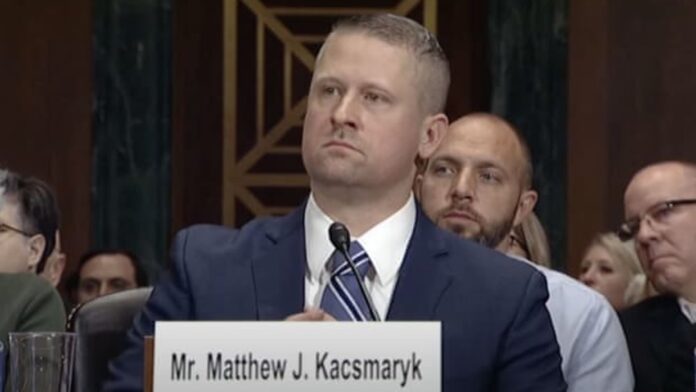Citing death threats and harassing phone calls, the federal judge who is presiding over a pivotal case that could decide the future of the abortion pill in the U.S. asked attorneys not to publicize the date of a key hearing, telling them “less advertisement is better.”
Judge Matthew Kacsmaryk of the U.S. Northern District of Texas held a telephone conference with attorneys in the case on Friday in which he set oral arguments for Wednesday morning. But Kacsmaryk asked the attorneys to not to publicize the hearing, citing security concerns.
“And because of limited security resources and staffing, I will ask that the parties avoid further publicizing the date of the hearing,” Kacsmaryk told the attorneys, according to a court transcript of the conference call.
“This is not a gag order but just a request for courtesy given the death threats and harassing phone calls and voicemails that this division has received,” the judge said.
“We want a fluid hearing with all parties being heard. I think less advertisement of this hearing is better,” Kacsmaryk said, adding that he didn’t want an “unnecessary circus-like atmosphere.”
Kacsmaryk joined the court in 2019 after he was appointed by former President Donald Trump. His appointment was opposed by Senate Democrats as well as Republican Sen. Susan Collins of Maine, who supports abortion rights. His nomination was also opposed by abortion and LGBTQ rights groups such as Planned Parenthood and the Human Rights Campaign.
Those present at the Friday conference call included lawyers from the Justice Department, the abortion pill maker Danco Laboratories, and a group that opposes abortion called the Alliance Defending Freedom.
An attorney from the Justice Department, Julie Straus Harris, asked the judge whether the date of the hearing would be made public on the court docket. Kacsmaryk responded that he would make it public on Tuesday but it “may even be after business hours,” shortly before the Wednesday morning hearing.
The judge has set oral arguments in the case for 9 a.m. central time at the U.S. courthouse in Amarillo, Texas. The hearing will be open to the public. The Washington Post first reported that Kacsmaryk wanted to delay public disclosure of the hearing, citing people familiar with the matter.
Although Kacsmaryk sought to delay sharing the date of the hearing until late Tuesday, media outlets sent a letter to the court on Monday urging the judge to immediately disclose the date. The court shared the date of the hearing on the docket later that afternoon.
Join CNBC’s Healthy Returns on March 29th, where we’ll convene a virtual gathering of CEOs, scientists, investors and innovators in the health care space to reflect on the progress made today to reinvent the future of medicine. Plus, we’ll have an exclusive rundown of the best investment opportunities in biopharma, health-tech and managed care. Learn more and register today: http://bit.ly/3DUNbRo
The media outlets included The Washington Post, NBCUniversal News Group of which CNBC is a part, ProPublica, the Texas Press Association and Gannett, among others. Peter Steffensen with Southern Methodist University’s First Amendment Clinic at the Dedman School of Law sent the letter on behalf of the media outlets.
“The Court’s attempt to delay notice of and, therefore, limit the ability of members of the public, including the press, to attend Wednesday’s hearing is unconstitutional, and undermines the important values served by public access to judicial proceedings and court records,” Steffensen wrote.
A group of physicians who oppose abortion called the Alliance for Hippocratic Medicine asked Kacsmaryk in November to order the Food and Drug Administration to withdraw its approval of the abortion pill mifepristone. The FDA approve mifepristone more than 20 years ago in 2000.
The abortion pill has become the central flashpoint in the legal battle over access to abortion in the wake of the Supreme Court’s ruling that overturned Roe v. Wade last June. Mifepristone, used in combination with another drug called misoprostol, is the most common method to terminate a pregnancy in the U.S., accounting for about half of all abortions.
The Alliance for Hippocratic Medicine is represented by attorneys from the Alliance Defending Freedom, which worked with Mississippi lawmakers to draft the law at the center of Dobbs v. Jackson Women’s Health Organization. That case ultimately resulted in the Supreme Court overturning abortion rights under the U.S. Constitution.
Biden administration lawyers, in a January court filing, described the case challenging the FDA approval of mifepristone as “unprecedented.”
The government lawyers warned that overturning the FDA approval of mifepristone would effectively pull the pill from the market which would dramatically harm the public interest. They said the health of women who rely on mifepristone as a safe and effective drug would suffer. The authority of the FDA to approve drugs based on its scientific determinations would also be weakened, the lawyers argued.
“If longstanding FDA drug approvals were so easily enjoined, even decades after being issued, pharmaceutical companies would be unable to confidently rely on FDA approval decisions to develop the pharmaceutical-drug infrastructure that Americans depend on to treat a variety of health conditions,” the Biden administration lawyers wrote.


